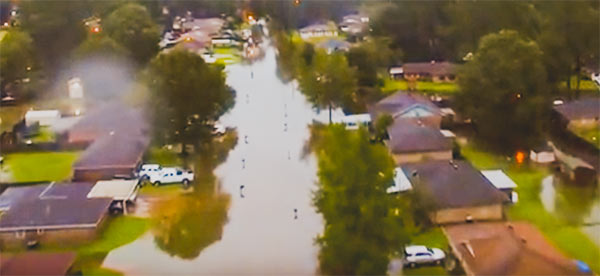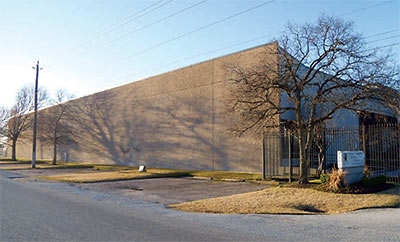COMMENT OF THE DAY: YOU SHOULD GET FLOOD INSURANCE EVEN IF YOU LIVE OUTSIDE ANY DESIGNATED FLOODPLAIN  “Consider the following:
1.) Houston as a whole is a low-lying area.
2.) FEMA Flood Maps are outdated; this is not a new revelation following Harvey.
3.) Flood insurance for Zone X is cheap (I pay $425/year for $200k building/$80k contents coverage)
4.) Your house is outside of both the 1% and 0.2% flood plains (i.e. Zone X).
Given those four conditions alone, buying flood insurance should be a no brainer for anyone that owns property in Houston, particularly if you’re even *near* a 100- or 500-year line. And after this event, which has made it quite clear that the models that determine what a 0.2% and 1% event is are inadequate, not getting flood insurance wherever you are in this town makes no sense at all. Heck, it doesn’t even take a Harvey to flood your ‘never been flooded house’ – all it takes is a blocked storm drain, a collapsed drainage ditch, poor lot grading, or any number of other non-“biblical†localized catastrophic events. Hopefully more people will realize this now, but it’s very sad that so many didn’t until 40-50 in. of rain fell over the entire county in less than 48 hours. [meh, commenting on Suing the Army Corps for Reservoir Releases; A City App for Debris Removal; 30 Years of the GRB] Illustration: Lulu
“Consider the following:
1.) Houston as a whole is a low-lying area.
2.) FEMA Flood Maps are outdated; this is not a new revelation following Harvey.
3.) Flood insurance for Zone X is cheap (I pay $425/year for $200k building/$80k contents coverage)
4.) Your house is outside of both the 1% and 0.2% flood plains (i.e. Zone X).
Given those four conditions alone, buying flood insurance should be a no brainer for anyone that owns property in Houston, particularly if you’re even *near* a 100- or 500-year line. And after this event, which has made it quite clear that the models that determine what a 0.2% and 1% event is are inadequate, not getting flood insurance wherever you are in this town makes no sense at all. Heck, it doesn’t even take a Harvey to flood your ‘never been flooded house’ – all it takes is a blocked storm drain, a collapsed drainage ditch, poor lot grading, or any number of other non-“biblical†localized catastrophic events. Hopefully more people will realize this now, but it’s very sad that so many didn’t until 40-50 in. of rain fell over the entire county in less than 48 hours. [meh, commenting on Suing the Army Corps for Reservoir Releases; A City App for Debris Removal; 30 Years of the GRB] Illustration: Lulu
Insurance
WHY YOU MIGHT WANT TO FILE YOUR HARVEY INSURANCE CLAIMS BEFORE FRIDAY  Suffered property damage from Hurricane Harvey and have access to a smartphone, computer, pen and paper, or your insurance agent? Forget about waiting for waters to recede before filing any insurance claim. You’ll want to do it now — or at least before Friday. What’s the rush? The new Texas law formerly known as House Bill 1774, passed by the Texas Legislature this session and signed by Governor Abbott in May, goes into effect on September 1. The “hailstorm lawsuit reform” measure reduces property owners’ leverage with insurance companies in weather-related claims — by making it more difficult for homeowners to sue agents successfully, increasing the obstacles to filing and carrying through with lawsuits over insurance coverage, and limiting the penalties insurance companies could face if they lose a lawsuit against you. To prevent your coverage from falling under these stipulations, notify your insurance provider of your claims before the law goes into effect, and document your correspondence. [Community Impact; Texas Tribune; Property Insurance Coverage Law Blog] Photo: Randy Poole
Suffered property damage from Hurricane Harvey and have access to a smartphone, computer, pen and paper, or your insurance agent? Forget about waiting for waters to recede before filing any insurance claim. You’ll want to do it now — or at least before Friday. What’s the rush? The new Texas law formerly known as House Bill 1774, passed by the Texas Legislature this session and signed by Governor Abbott in May, goes into effect on September 1. The “hailstorm lawsuit reform” measure reduces property owners’ leverage with insurance companies in weather-related claims — by making it more difficult for homeowners to sue agents successfully, increasing the obstacles to filing and carrying through with lawsuits over insurance coverage, and limiting the penalties insurance companies could face if they lose a lawsuit against you. To prevent your coverage from falling under these stipulations, notify your insurance provider of your claims before the law goes into effect, and document your correspondence. [Community Impact; Texas Tribune; Property Insurance Coverage Law Blog] Photo: Randy Poole
COMMENT OF THE DAY: WHAT FLOOD INSURANCE FLOWS FROM  “The NFIP is a creation of Congress meant to insure against a peril which the private insurance industry refuses to insure against. The reason private insurance refuses is because there is no actuarially sound method to do so. Effectively, federal flood insurance is not pure risk insurance but actually a type of social insurance. To move the conversation forward on flood insurance reform, that fact has to be acknowledged first. By properly characterizing it as social insurance, we can start talking about how much more people in flood prone areas should pay.” [Jardinero1, commenting on The Limits of Mapping Flood Risk; Original Beaver’s Takes a Summer Vacation] Illustration: Lulu
“The NFIP is a creation of Congress meant to insure against a peril which the private insurance industry refuses to insure against. The reason private insurance refuses is because there is no actuarially sound method to do so. Effectively, federal flood insurance is not pure risk insurance but actually a type of social insurance. To move the conversation forward on flood insurance reform, that fact has to be acknowledged first. By properly characterizing it as social insurance, we can start talking about how much more people in flood prone areas should pay.” [Jardinero1, commenting on The Limits of Mapping Flood Risk; Original Beaver’s Takes a Summer Vacation] Illustration: Lulu
COMMENT OF THE DAY: WHAT ENDING FEDERAL FLOOD INSURANCE SUBSIDIES COULD DO FOR GALVESTON  “Biggert-Watters would have destroyed the home market in many of Galveston’s West End beach communities. My wife and I were looking at homes just as the revised rate plan went into effect in late 2013. The quote I received for JUST FLOOD INSURANCE on a $250K house was $40,000 per year. As long as the government allows federally backed mortgages in these areas, they will have to subsidize the insurance rates. It really is that simple. If the rates aren’t subsidized, the market will collapse for these homes. It will be a vicious circle. Those that need a mortgage to afford a home won’t be able to afford insurance. Those who own a home with a mortgage won’t be able to afford insurance. Homes will only be marketable to cash buyers who can self-insure. How much would you pay for a home that you could only market via an owner-financed or cash transaction? A property that would essentially be unmarketable to buyers via traditional mortgage.” [Mike Honcho, commenting on Comment of the Day: Why You Can Get Flood Insurance in Houston] Illustration: Lulu
“Biggert-Watters would have destroyed the home market in many of Galveston’s West End beach communities. My wife and I were looking at homes just as the revised rate plan went into effect in late 2013. The quote I received for JUST FLOOD INSURANCE on a $250K house was $40,000 per year. As long as the government allows federally backed mortgages in these areas, they will have to subsidize the insurance rates. It really is that simple. If the rates aren’t subsidized, the market will collapse for these homes. It will be a vicious circle. Those that need a mortgage to afford a home won’t be able to afford insurance. Those who own a home with a mortgage won’t be able to afford insurance. Homes will only be marketable to cash buyers who can self-insure. How much would you pay for a home that you could only market via an owner-financed or cash transaction? A property that would essentially be unmarketable to buyers via traditional mortgage.” [Mike Honcho, commenting on Comment of the Day: Why You Can Get Flood Insurance in Houston] Illustration: Lulu
COMMENT OF THE DAY: WHY YOU CAN GET FLOOD INSURANCE IN HOUSTON  “There is no market at all for flood insurance. It’s a massive federal subsidy that is merely administered by private companies.
You can’t effectively insure against floods.
This is one of those things many Texans like to ignore — that our coastal development is highly subsidized in the form of the government-backed NFIP.” [JR, commenting on Comment of the Day: A Better Way To Tell If Your Home Is Going to Flood] Illustration: Lulu
“There is no market at all for flood insurance. It’s a massive federal subsidy that is merely administered by private companies.
You can’t effectively insure against floods.
This is one of those things many Texans like to ignore — that our coastal development is highly subsidized in the form of the government-backed NFIP.” [JR, commenting on Comment of the Day: A Better Way To Tell If Your Home Is Going to Flood] Illustration: Lulu
COMMENT OF THE DAY: THE COMING FLOOD OF FLOOD INSURANCE PREMIUM HIKES  “If flood insurance becomes as expensive as predicted by the Chron article, it would make large parts of Houston financially uninhabitable. Folks owning property in the Heights now have even more reason to be pleased with themselves.” [Chef, commenting on Headlines: A PAC for the Astrodome Plan; A Kibosh on Free Rail Rides to Texans Games] Illustration: Lulu
“If flood insurance becomes as expensive as predicted by the Chron article, it would make large parts of Houston financially uninhabitable. Folks owning property in the Heights now have even more reason to be pleased with themselves.” [Chef, commenting on Headlines: A PAC for the Astrodome Plan; A Kibosh on Free Rail Rides to Texans Games] Illustration: Lulu

How was Seabrook homeowner Brad Gana able to wriggle out of foreclosure proceedings on his home at the last minute? By hiring a lawyer to argue that his house does not exist. And indeed, the visual evidence is compelling: All that’s left of Gana’s waterfront structure at 1910 Todville Rd., which apparently washed away 3 years ago during Hurricane Ike while Gana was working overseas, is an empty slab, protected by a front gate and littered until recently with a few of Gana’s tools and collectibles. (After the proceedings were canceled, KPRC’s Amy Davis reports, Bank of America had those items removed from the property.)

Looking for a safe place to keep its voting machines after the previous storehouse on Canino Rd. was destroyed in a mysterious fire last year, county officials have at last found the perfect uh, match: a 1980-vintage tilt-wall car-storage facility owned by the estate of a billionaire plaintiff’s attorney who died in a car crash. No harm came to the $250 million worth of cars John M. O’Quinn kept in this warehouse at 11525 Todd Rd. after he was killed in an accident on Allen Parkway 2 years ago, but the building was available. One of 3 suites in the 123,930-sq.-ft. structure near the Hempstead Highway and 34th St. currently serves as the black-box home of the Houston Academy of Dramatic Arts. The county is paying O’Quinn’s estate $4.35 million for the facility, with some of that money coming from the fire-insurance claim. Also moving into the building, after a $2 million renovation: county tax assessor-collector Don Summers and his collection of old license plates and tax records.
- County voting machines find a home [Houston Chronicle]
- Warehouse blaze still a mystery and Police: O’Quinn driving nearly twice the speed limit [Houston Chronicle]
- Voting machine fire not arson [Houston Politics]
Photo: LoopNet
THAT FLOOD OF DOLLARS Flooding means big bucks for Houston! And just think of how much more cash we could be raking in here if more than 1 in 5 households bought in: “Since 1978, Houstonians have received more than $1 billion worth of flood insurance checks, according to the National Flood Insurance Program. That ranks fifth among cities and counties nationally. Harris County, not counting Houston, ranks seventh. Flood Control District spokeswoman Heather Saucier cites the figures as proof that locals who have flood insurance use it. ‘If you don’t live in a mapped floodplain, It doesn’t mean you don’t need flood insurance. It means you get cheaper flood insurance,’ Saucier said. She said most insurance companies carry it, and since agents just pass through NFIP policies at set rates, no shopping around is necessary. Congress has let the flood insurance program lapse, but Linda Delamare, the federal government’s senior regional insurance specialist for Texas and four other states, said the lapse is temporary. Congress routinely reauthorizes the program in short order, and consumers should still pursue policies, she said.” [Houston Chronicle]
SOUNDING THE ALARM AT THE AURORA PICTURE SHOW The microcinema’s founder, Andrea Grover, reports on the little Sunset Heights church on Aurora St. turned little movie theater — turned little crime scene: on recent events at the Menil-bungalow office of Aurora Picture Show on Sul Ross: “Now that the dust has settled . . . it’s OK to tell you: Aurora was burglarized, not once, but twice in 9 days, and the insurance claim was denied. . . . There was a small clause about a B3 monitoring system (a monitored alarm) that was not highlighted at signing and allowed the insurer to deny Aurora, after eleven uninterrupted years of payments to them (without a single claim) – probably amounting to $30-40,000 in insurance payments. . . . Now, out over $5000 worth of equipment, plus staff time, and contract labor for clean up . . .” [Facebook, via Arts in Houston]
COMMENT OF THE DAY: RELEASING THE WILSHIRE VILLAGE INSURANCE HOLD “. . . Why keep residents there? Insurance for an occupied commercial exposure is MUCH cheaper than a vacant one. Vacant buildings or sites have to be secured to prevent problems with the city and attractive nuisance lawsuits. Rent was coming in, even if it was minimal. All roads lead to the fact that it was financially advantageous to not change anything until time to do something else with the property.” [Hellsing, commenting on Wilshire Village Moving Day: They Shall Be Released]
WHERE THERE’S SMOKE That fire in the atrium office building at 9343 North Loop East almost 2 years ago still heats up the Houston real estate scene: “An insurance company with a potential $25 million liability from a 2007 Houston office fire is claiming smoke that killed three people was ‘pollution’ and surviving families shouldn’t be compensated for their losses since the deaths were not caused directly by the actual flames. Great American Insurance Company is arguing in a Houston federal court that the section of the insurance policy that excludes payments for pollution — like discharges or seepage that require cleanup — would also exclude payouts for damages, including deaths, caused by smoke, or pollution, that results from a fire.†[Houston Chronicle]
MIDSUMMER BOOKS: 8 FEET IS ENOUGH This fall was the final season for Midsummer Books, near the Strand in Galveston: “‘All those shops and restaurants on Strand, Mechanic and Postoffice were hit bad, and Midsummer Books got 8 ft of muddy water which soaked and ruined everything, books, furniture, computer equipment, etc.,’ owner Tim Thompson says by e-mail. ‘Luckily I have flood insurance so I will most likely get compensated for the loss. However, this is one of those times in life where tough decisions have to be made and for a variety of reasons I have decided not to ressurect Midsummer Books,’ he says.” [Hair Balls]
 For months, the giant, burned-out shell of a home has been sitting on an acre lot at the corner of Links Crossing Lane and Augusta Pines Parkway in Spring, less than half a mile from the baby Bermuda grass fairways of the Augusta Pines Golf Course and its 100,000-sf “southern style” clubhouse. But now Harris County Fire Marshal investigators are reporting that the fire that destroyed the 7000-sf McMansion in February was a poorly concealed arson. While owner Michael Macomber was vacationing in the Bahamas, a man named Adnan Aquil filled the home with 25 five-gallon cans of gasoline he had purchased over several days from Wal-Mart and arranged them so they would ignite spectacularly.
For months, the giant, burned-out shell of a home has been sitting on an acre lot at the corner of Links Crossing Lane and Augusta Pines Parkway in Spring, less than half a mile from the baby Bermuda grass fairways of the Augusta Pines Golf Course and its 100,000-sf “southern style” clubhouse. But now Harris County Fire Marshal investigators are reporting that the fire that destroyed the 7000-sf McMansion in February was a poorly concealed arson. While owner Michael Macomber was vacationing in the Bahamas, a man named Adnan Aquil filled the home with 25 five-gallon cans of gasoline he had purchased over several days from Wal-Mart and arranged them so they would ignite spectacularly.
According to investigators, Macomber has now confessed that he paid Aquil $10,000 for his handiwork, before filing a $1.2 million insurance claim.
What made Macomber do it? Was he tired of being overextended on an overmortgaged, overpriced, and oversized home in an overmarketed subdivision in Northwest Houston?
“He was holding on to everything,” [Harris County Senior Arson Investigator Dustin] Deutsch said. “His credit score was getting impacted, payments were getting impacted. The county probably didn’t appreciate him bouncing his tax check. . . .”
Of course there’s more to the story:
“After further scrutiny of the closing paperwork, investigators determined that the residence’s value was grossly overvalued by a local real estate appraiser,” Harris County Arson Investigations officials stated in a media address. “It was also learned that Macomber grossly inflated his stated income to the mortgage company. This embellishment included forged financial documents and other misleading credentials.”
In return for paying an inflated price for the Augusta Pines McMansion in March 2006, Macomber allegedly received a $171,000 kickback from the seller. In all, seven people, including a neighbor couple, have been charged in fraud related to this home. According to KHOU, every house on the street has been foreclosed on.
Yes, it’s a short street.
- Seven charged in arson, insurance fraud scheme [Spring Observer]
- Mortgage fraud burns homeowners [KHOU]
- Several charged in alleged fraud and arson scheme [abc13.com]
Photo of 7802 Links Crossing Ln.: KHOU
Bankrate’s annual survey of home-mortgage closing costs shows Texas has the second-priciest mortgage closing costs of any state. How come? Title insurance and title searches. Texas has the most expensive in the country:
. . . the insurance department sets (or “promulgates”) the rates, with heavy input from the title agencies and insurance companies. Because the state establishes the rates, title companies don’t compete for consumers by offering lower prices.
How do title insurers compete in states where regulators set prices? According to a report issued in April by the Government Accountability Office, “title agents do not market to consumers, who pay for title insurance, but to those in the position to refer consumers to particular title agents, thus creating potential conflicts of interest.” The report says the industry is rife with kickbacks and undisclosed referral fees among title agents, real-estate agents and lenders.
The study showed that title insurance in Houston (the only Texas city polled for the study) averaged $1,185.06 for a $200,000 mortgage, 68 percent higher than the national average of $707.30. Title search costs averaged $305.08, 54 percent higher than the national average of $197.71.
In his blog, report author Holden Lewis adds a personal comment:
As a native of the Lone Star State, I urge my erstwhile neighbors to ask their members of the Lege why they allow the insurance department to get bulldozed by the title insurance industry. Maybe Texas could set a reasonable objective to have the fifth-most expensive title insurance in the country? That’s doable, right? I mean, Texas doesn’t have to be No. 1 in everything. Or maybe the state could force title insurers to compete in a free market — although cartels are pretty good at making a mockery of a market.
- New York has costliest mortgage fees [Bankrate.com]
- Closing costs averages: Texas [Bankrate.com]
- In closing . . . [Mortgage Matters]

